
The newsletter crew reflect on their own application experiences

Hello everyone! In this article, the Through the Porthole Crew opens up and discusses our experiences applying to graduate school. Each crew member provides a unique perspective on the motivating life experiences that helped us when writing our personal statements. Additional information on the paths one can take to graduate school can be found here.
Chloe Dean
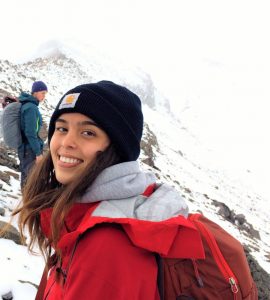
My path to graduate school was not very straightforward. After finishing undergrad, I took a six-month break to travel the West Coast in a van with my partner and cat and then spent the next two years working as a lab technician at an industrial hemp processing company. However, it was the stark reality of the current climate crisis that motivated me to pursue graduate school so I could join the community of scientists and engineers who are working to solve issues around climate change. I started graduate school applications in the summer of 2020 filled with apprehension, not only in regard to my two-year break from academia but also due to the uncertainty stemming from the global pandemic. This apprehension pushed me to reach out to as many people as I could, including previous mentors, potential advisors, current and past graduate students, and even graduate program administrators. Speaking to multitudes of people provided me with diverse perspectives and inevitably diminished my apprehension and uncertainty regarding the application process.
When I started preparing my personal statements, rather than shying away from my “non-academic” experiences, I highlighted them and described how they shaped my perspective and readiness for graduate school. That said, I also made sure to balance my personal narrative with specific details regarding my research experience and education. I also concentrated on clearly describing how my research focus would fit into the program, as well as how the program would fit me and my future goals. In the end, the best advice I could share is to start writing and preparing early (in the late spring/early summer if possible) and lean on your network for feedback and guidance!
Paris Smalls
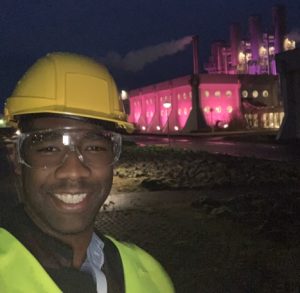
I had no intentions of going to college when I was a senior in high school. In fact, I didn’t even bother to put in an application to any undergraduate programs. Neither one of my parents went to college, and none of my family members that went studied science or engineering. My plan in high school was to continue pursuing a career in track and field, and college seemed unnecessary at the time. Luckily for me, my mother put in an application on my behalf, and I was able to attend a small university for 1-year, before transferring to a larger university out-of-state to run track as a college athlete. Majoring in the earth sciences allowed me to have in-state tuition, thus making college affordable since I did not have a full track scholarship. At the time, I had no idea that it would be the earth sciences, and not track, that would drive my future passions and shape my career path. In my Sophomore year, I decided that it was time for me to leave the track team and focus more on my studies, and I joined a research lab. The remainder of my undergraduate career was spent conducting research, and studying hard to catch-up to my peers that knew they wanted to be scientists since high school. I determined that I needed more time, and decided to apply to graduate school.
In my personal statement, I wrote about my very non-traditional path to academia. I highlighted my inspirations, from my mother who went out of her way to make sure I went to college, to the hard work and discipline that went into being a D-1 track athlete, and how this translated into my academic pursuits. I also discussed my newly found desire to learn more about geothermal energy, and how the learnings from the Yellowstone project I was applying to work on would translate into a future career in the geothermal industry. It would be another 7-years until I visited my first geothermal power plant in Iceland (pink building behind me), but my passion for geothermal has only grown since I wrote my personal statement.
Danielle Haas Freeman
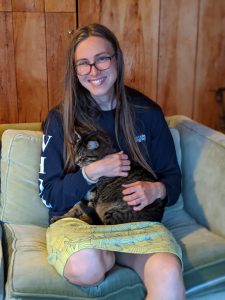
Applying to graduate school for environmental chemistry was an incredible personal challenge. It forced me to think seriously about what kind of person I was, what kind of career I wanted to have, and what my priorities were outside of my work. I didn’t like going through this mental exercise at first: It was scary. All throughout my life I had enjoyed jumping from one academic challenge to the next, in very different fields, from literature to languages to environmental chemistry. On top of that, after graduating college, I worked as a teacher for two years and, while I was ready for a new challenge, I also knew I would miss teaching. I didn’t want to have to choose one version of myself, and I was afraid that attending grad school in the sciences meant suppressing the other sides of myself. What if I was choosing the wrong version of myself? None of my family members were scientists. The community I grew up in was not science-y. Not everyone I was close to supported my choice to pursue a graduate degree in environmental science. What if they were right? What if I weren’t smart enough, or not good enough at research? Or what if I would never make a convincing scientist since I hadn’t wanted to be one since I was five? (If you’re in a situation like this, I can promise you: They’re not right. You are good enough, no matter what you decide to do regarding your grad school applications.)
Luckily, during this time of internal turmoil, I was surrounded by dedicated academic mentors who sat down to talk with me about my career and personal interests, and who I knew would support my decision no matter what career path I chose. I did a lot of journaling and asked myself tough questions about my priorities. And I asked my academic mentors about their own experiences making their grad school decisions. The benefit of working through my uncertainties and fears, rather than simply ignoring them, was that when it came time to write my applications, I felt confident that I was making the right choice for me, and I no longer felt that attending grad school in the sciences meant narrowing down my choices; instead it felt like a new opportunity to learn and grow, even if my priorities changed later on. Walt Whitman would say: “I am large, I contain multitudes.” I did not quote Walt Whitman in my personal statements. But I did frequently leaf through his poems while writing them.
So what did I end up writing my personal statement about? I focused on what excited me about environmental chemistry and what experiences had helped me develop that excitement. I emphasized what new and surprising things I had learned about science and the scientific research process even—especially—when experiments didn’t work as planned. And I solicited feedback from those key academic mentors who had helped me think through my future plans.
Noah Germolus
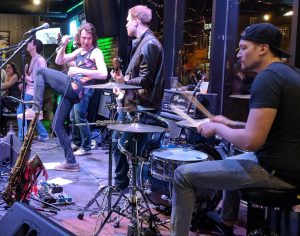
I didn’t originally intend on graduate school, so the process of getting my ducks in a row was nerve-racking. I still don’t like asking people for letters of reference, especially since I may have to ask multiple times for multiple applications, but in the end, I learned that it’s something most people are happy to do. I had little research experience and banked on putting myself out there in a heartfelt way in my personal statement. Apparently, it worked; however, that was not easy. Such a piece of writing (especially as rewired for each school) is for me an act of dancing on a tightrope strung between earnest personality and showboat professionalism. You don’t have to do that to apply to most engineering jobs, and I spent many hours at home and around campus shirking my normal homework time trying to calibrate a document that demands I have an idea of both who I am and what I want. These are big, important questions that are tiring even if asked casually, but your answer need not be final and binding. The same is true for this document as is for all writing: Just write something, and then get someone else’s eyes on it. I was fortunate to have my undergrad thesis advisor help me with the wording, and the sooner you can find someone to look over your draft(s), the better.
Ian Jones
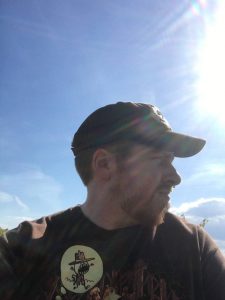
By the time I was applying to graduate school, I was pretty sure I wanted to study, broadly (but what seemed like a narrowed-down field to me at the time): the sensory biology of marine animals. I had some exposure to this realm of research in undergraduate coursework and in past laboratory work. I was very fortunate to have a prior research internship, in this case at WHOI where I applied to grad school, which helped solidify my desire to perform independent research. Having concrete examples of experiences that shaped what I want to study and my decision to pursue graduate school were helpful for me in preparing a strong statement. The first thing I did to prepare writing was listing out these experiences, including volunteer positions, research experience, particular subjects from undergraduate courses, and other personal experiences that either shaped my research interests or helped me build knowledge or skills I felt would prepare me for coursework and research in graduate school. I picked the ones I felt were most influential and I organized them to tell a story where I described each experience in turn, what I gained from it, and how I think it helped prepare me to be a graduate student. I had to do some deep reflection and a little denial of my imposter-syndrome to convey that I gained things such as “confidence in multiple steps of the research process”, “newfound interests” from past projects and that I really was certain that graduate school was the best, next step for the career in science I wanted.
It’s important to stress that “behind-the-scenes” it’s okay if you’re not really sure about the specific career you want or the research field you want to study. A major purpose of graduate school itself is to figure that stuff out! That said, my understanding was that projecting confidence in your ability, and your passion to “do science” is an important part of making a strong statement, so I did my best to convey that throughout the statement.
I also made sure to stress why I was applying to a particular institution and program, including the lab(s) I would be interested in working with, and any courses, facilities, mentoring or teaching opportunities, or other aspects of the program I thought would really help me develop as a scientist.
Lastly, it really helped me to have some past mentors, in my case the same individuals who wrote my letters of recommendation, read over my personal statement and provide comments on how to make it stronger. In turn, having a draft of my statement helped them tailor their letters of recommendation to the specific program I was applying for.
Jule Middleton
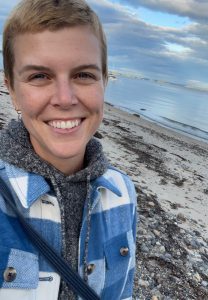
Growing up, both of my parents held graduate degrees, and the idea of going to school after college was something that I always envisioned for myself. It was clear to me that post-secondary education would allow me to continue pursuing the type of discovery that I find joy in and allow me to get a job that would leave me financially stable. Because of this, I spent much of college devouring the science curriculum at my small liberal arts school and participating in a wide range of research. In my application to graduate school, I wrote the story of how in many ways I felt like my life had led me to oceanography (a field which I did not realize you could actually work in until halfway through college). Including both the personal and “research skills” side of my path to graduate school helped me write an application that I felt was both an exposé of my scientific expertise, and gave the reader a sense of how science fit into my self-image as an individual.
Read more of Through the Porthole Issue #4
Learn more about Through the Porthole
Learn more about the MIT-WHOI Joint Program